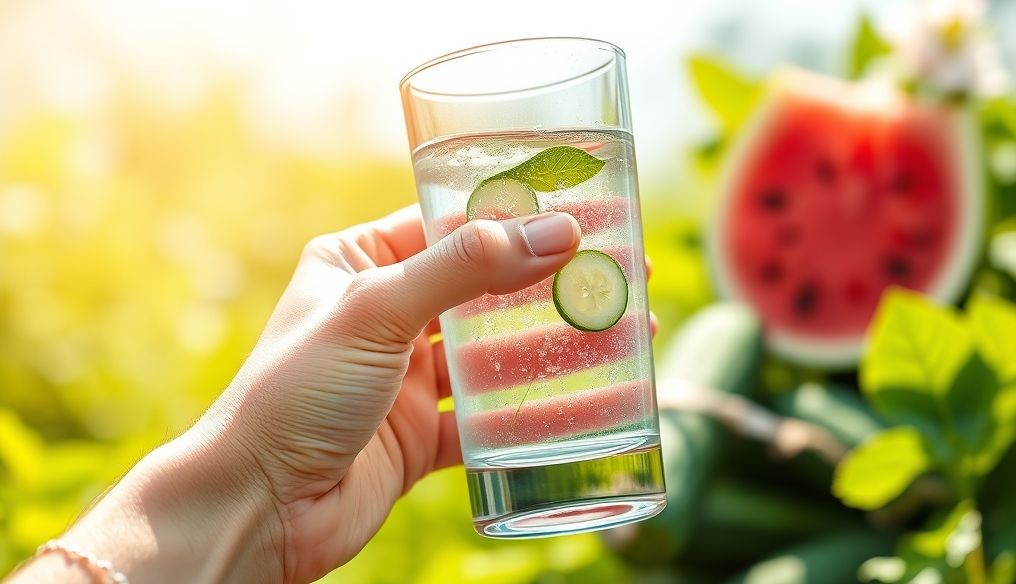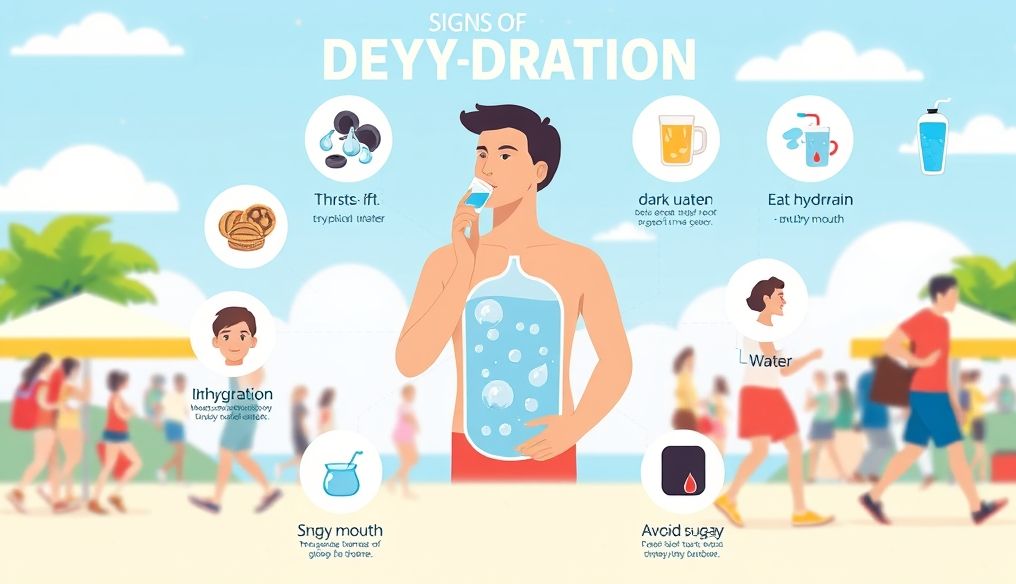What is Dehydration and Why is it Dangerous?
Dehydration occurs when the body loses a significant amount of fluids, disrupting the natural balance of essential minerals and salts needed for vital bodily functions. Water makes up about 55% to 78% of body weight and is essential for many processes, including:
- Regulating body temperature
- Transporting nutrients and oxygen to cells
- Lubricating joints
- Eliminating waste products
When the body loses too much water, it becomes difficult to perform these functions properly, leading to dehydration symptoms that range from mild to severe. In severe cases, it can lead to serious complications such as organ damage, kidney failure, and even death.
Common Causes of Dehydration
Several factors can lead to dehydration, including:
- Not drinking enough water: This is the most common cause of dehydration, especially in people who don't feel thirsty or forget to drink water regularly.
- Excessive sweating: Excessive sweating can occur due to strenuous exercise, exposure to high temperatures, or certain medical conditions.
- Diarrhea and vomiting: Diarrhea and vomiting can lead to the loss of a large amount of fluids and minerals in a short period.
- Fever: Fever increases the metabolic rate, leading to more fluid loss.
- Certain medications: Some medications, such as diuretics, can increase fluid loss through urine.
- Certain medical conditions: Some medical conditions, such as diabetes and kidney disease, can increase the risk of dehydration.
Signs and Symptoms of Dehydration
The signs and symptoms of dehydration vary depending on the severity of the condition. Here are some common signs and symptoms:
Mild to Moderate Dehydration:
- Extreme thirst
- Dry mouth and tongue
- Headache
- Dizziness
- Reduced urination
- Dark-colored urine
- Constipation
- Muscle cramps
Severe Dehydration:
- No urination or very little urination
- Very dark-colored urine
- Extreme dryness of the mouth and skin
- Low blood pressure
- Rapid heart rate
- Rapid breathing
- Sunken eyes
- Confusion or disorientation
- Loss of consciousness
Note: Seek immediate medical attention if you experience signs of severe dehydration.
Who is Most at Risk of Dehydration?
Certain groups are more prone to dehydration than others, including:
- Infants and young children: They have a larger body surface area relative to their weight, making them more prone to fluid loss. They may also be unable to express their thirst.
- Older adults: They may feel less thirsty and may have health problems that make them more susceptible to dehydration.
- Athletes: They lose a significant amount of fluids through sweating during exercise.
- People with chronic diseases: Such as diabetes and kidney disease.
- People living in hot or humid climates: They are more prone to excessive sweating.
How to Prevent Dehydration
Preventing dehydration is simple and can be achieved by following some important tips:
Drink Enough Water
Drink enough water throughout the day, even before you feel thirsty. The recommended amount of water varies from person to person, but generally, you should drink at least 8 cups of water per day. This amount can be increased on hot days or when exercising.
Eat Water-Rich Foods
You can get fluids from water-rich foods, such as fruits and vegetables. Some good options include watermelon, cucumber, strawberries, and oranges.
Avoid Dehydrating Beverages
Avoid beverages that contain caffeine or alcohol, as they can increase fluid loss through urine.
Wear Light, Loose-Fitting Clothing
Wearing light, loose-fitting clothing helps regulate body temperature and reduce sweating.
Avoid Direct Sunlight
Avoid direct sunlight, especially during peak hours, and wear a hat and sunglasses.
Monitor Urine Color
Urine color is a good indicator of hydration levels. Urine should be light in color. If the urine is dark, it means the body needs more fluids.
Treating Dehydration
Treatment for dehydration depends on the severity of the condition. In cases of mild to moderate dehydration, it can be treated by drinking more fluids, such as water or oral rehydration solutions. In cases of severe dehydration, it may be necessary to admit the patient to the hospital to receive fluids intravenously.
Oral Rehydration Solutions
Oral rehydration solutions (ORS) are a good option for treating dehydration, especially in children. These solutions contain a mixture of water, salts, and minerals that help replenish lost fluids.
Additional Tips for Preventing Dehydration in Daily Life
- Keep a water bottle with you at all times: Make it a habit to carry a water bottle with you wherever you go, and refill it regularly.
- Drink water before, during, and after exercise: Don't wait until you feel thirsty.
- Drink water with meals: This helps hydrate the body and promote digestion.
- Set a reminder to drink water: Use phone apps or alarms to remind you to drink water regularly.
- Offer water to children and the elderly regularly: Make sure they are drinking enough water, especially on hot days.
Common Myths About Dehydration
There are some common myths about dehydration that need to be corrected:
- Myth: Only athletes need to drink a lot of water. Fact: Everyone needs to drink enough water to maintain good health.
- Myth: Water can be replaced with soda or juices. Fact: Sodas and juices contain large amounts of sugar and may increase dehydration.
- Myth: There is no need to drink water in cold weather. Fact: The body still needs water in cold weather, even if you don't feel thirsty.
Conclusion
Dehydration is a serious condition that can be easily prevented. By drinking enough water, eating water-rich foods, avoiding dehydrating beverages, wearing light, loose-fitting clothing, avoiding direct sunlight, and monitoring urine color, we can all stay hydrated and healthy. Always remember that prevention is better than cure.




